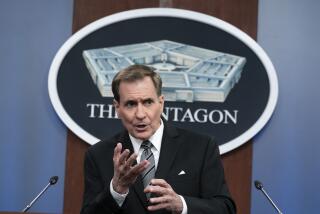Colombian Decries U.S. Aid Cutoff
BOGOTA, Colombia — The head of Colombia’s air force lashed out at the United States on Wednesday after it suspended aid to an elite military unit for failing to fully investigate a 1998 bombing that killed 18 civilians.
Gen. Hector Fabio Velasco charged that the U.S. was partly responsible for delays in the investigation, saying the FBI had neglected to thoroughly examine a key piece of evidence sent in for analysis nearly a year ago.
“This is a delay that, for me, is not justifiable,” Velasco said in an interview. “The answer that they gave is that they were occupied with the Twin Towers case, and that that was more important for them.”
Velasco said he had rejected suggestions from U.S. officials -- he declined to give names -- that he resign over the conduct of his troops. An air force helicopter crew is accused of dropping a U.S.-made cluster bomb on the village of Santo Domingo on Dec. 13, 1998, during an operation that allegedly was aided by two U.S. companies, Los Angeles-based Occidental Petroleum Corp. and Florida-based AirScan Inc.
He said the U.S. was applying a double standard concerning human rights violations.
“I don’t know the first case where a member of the United States [armed forces] has made a mistake or, let’s suppose, has consciously violated human rights, in which the battalion or the commander has been sanctioned,” Velasco said. “That’s what they’re doing in this case.”
U.S. officials declined to comment on Velasco’s criticism. But they noted that the suspension was designed to send a clear message that U.S. funds to Colombia, which have amounted to nearly $2 billion in mostly military aid over the last few years, are contingent upon the armed forces’ aggressively pursuing accusations of human rights violations.
“What we have asked for repeatedly is a credible investigation,” said a U.S. official who asked not to be identified. “We have not seen that.”
Velasco’s remarks amounted to the strongest condemnation yet from the Colombian government over the State Department’s decision, made public this week, to indefinitely suspend funding to the 1st Air Combat Command, which makes up 20% of the air force and has all its advanced fighter jets.
The comments also suggested that the Colombian government is unwilling or unable to address U.S. concerns about a speedy investigation and instead set the stage for continued confrontation over the case.
Velasco said the matter is in the hands of a military tribunal over which he has little influence -- though he received a briefing Wednesday from the military judge in charge of the case, a subordinate, and has kept close watch over the trial.
He criticized a separate investigation by the Colombian inspector general’s office, which found recently that the helicopter crew had deliberately targeted civilians in the bombing. Although he said he would respect the decision to suspend two of the crew members for three months, he said he doubted that the inspector general’s office had the expertise necessary to evaluate a military operation.
Velasco said two critical tests remained to complete the investigation. The first, a reenactment of the bombing, is scheduled for this month. The second is the results of the FBI analysis. With those results in hand, Velasco said, a resolution could come as soon as a month, leading to the possibility of renewed funds to the unit.
The villagers were killed when an air force helicopter dropped the bomb on Santo Domingo while battling leftist rebels in nearby jungle, the inspector general’s report concluded.
Occidental, which runs an oil pipeline 30 miles north of Santo Domingo, supplied food and supplies for the pilots, court records show. AirScan helped plan the mission and pick out targets, according to the records.
AirScan denies involvement. Occidental has said it cannot confirm whether it played a role.
The investigation into the bombing has been held up in a mind-boggling array of legal processes.
The air force initially shut down the investigation, saying there was no evidence of a cluster bomb. The service reopened it after the inspector general sent metal fragments taken from victims to the FBI, which determined that they probably came from a U.S. cluster bomb.
Velasco said the military tribunal sent a second set of fragments to the FBI last February to confirm the earlier finding. He said the FBI repeatedly put off responding to the tribunal before finally delivering a report last fall that the judges said was incomplete.
The U.S. official acknowledged that the FBI took a long time to analyze the fragments, noting that the Sept. 11 attacks delayed many investigations.
But he said the FBI’s final determination was that the tests of the fragments were “inconclusive” because the pieces were too small to be analyzed. He said no further report is forthcoming.
He also said the FBI analysts questioned the origin of the second set of fragments because they appeared so different from the first set.
“The chain of evidence in the first set is muddy, but it’s even muddier in the second set,” he said. “A skeptic would see this as evidence that they don’t want the case resolved.”
More to Read
Sign up for Essential California
The most important California stories and recommendations in your inbox every morning.
You may occasionally receive promotional content from the Los Angeles Times.










